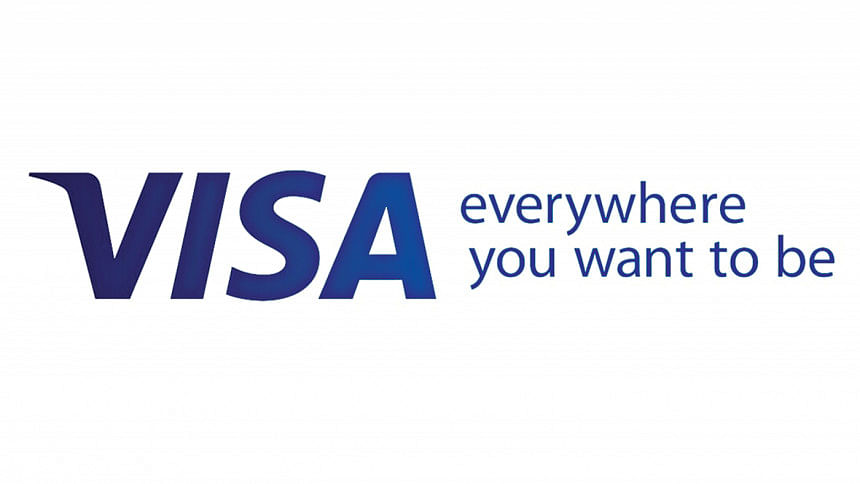Visa to finally set up shop in Bangladesh as cashless transactions gain momentum

Coronavirus has transformed people's everyday life significantly. Transactions and spending have overwhelmingly been altered by the disease, which is lethal and highly contagious.
While shopping at brick-and-mortar stores is down, e-commerce platforms are experiencing a surge in demand.
People don't want to go outside unless it's an emergency and they avoid touching physical things, which include cash. And everything is happening in a way that seems staged for the boon of cashless transactions.
Under such circumstances, Visa, the global leader in payments technology, unveiled its plans to establish a country liaison office in Dhaka, although it has been providing cards in Bangladesh for 32 years now, starting out with the humble magstripe card and now state-of-the-art tap and pay contactless cards.
"We believe it is an opportune time to leverage the explosive growth of digital payments through a team of Visa executives dedicated to Bangladesh," said Chris Clark, regional president of the company for the Asia Pacific, in a press release yesterday.
The office, expected to be set up by 2020, will employ a team of executives through whom Visa would introduce new services, drive social impact programmes and participate in the economic growth of Bangladesh.
The country office culminates decades of investments in Bangladesh in pioneering and driving digital payments, which, in turn, have helped fuel economic growth and played a significant role in the Digital Bangladesh mission, Visa said in a press release.
"Since commencing operations in Bangladesh in 1988, our business has played a distinct part in shaping the digital payment ecosystem in the country. We are truly excited about the potential the country holds and expect the local liaison office to further propel our market growth in years to come," Clark said.
Currently, Visa has partnerships with close to 50 banks, leading financial technology companies and processors.
In recent years, Visa launched Bangladesh's first contactless card and introduced open-loop, interoperable quick response (QR) payments in line with BanglaQR specifications to the market.
Visa has worked with large fintechs and e-commerce players as well to introduce card on file, wallet load and other best-in-class payment innovations.
The payments technology company is working with the regulatory agencies in Bangladesh and concerned authorities to acquire requisite permissions and set up the liaison office.
Visa's perennial rival MasterCard though had a physical presence in the country since 2013.
"Sensing the importance of the market in digital payments, we established an office in Dhaka. The office is run by locals," Syed Mohammad Kamal, country manager of MasterCard, told The Daily Star yesterday.
MasterCard made foray into the market 28 years ago and it now has partnerships with 20 banks, which cover lion-share of card transactions in the country.
It worked with the government in implementing many financial inclusion projects.
In December last year, Mutual Trust Bank in collaboration with Mastercard introduced an interoperable QR code-based payment acceptance solution -- Bangla QR -- aiming to boost cashless transactions, the first of its kind in Bangladesh.
The Bangla QR allows cardholders using credit, debit and prepaid cards to carry out payments using a QR code generated by the bank's mobile banking application.
In March, Mastercard and bKash launched a new service enabling customers to transfer funds instantly from debit, credit and prepaid cards to the wallets of the country's leading mobile financial service (MFS) provider round-the-clock, again for the first time in Bangladesh.
A few years ago, Mastercard introduced an online payments gateway in Bangladesh, in which it is a market leader.
"As we have a close relation with customers, we are providing all sorts of services to our clients during the pandemic."
During normal times many people come to Bangladesh from different countries and many locals also go abroad.
"Because of the pandemic, the card market has completely lost this business. It's a big business for us," Kamal said.
For the decrease in restaurant dine-in, the decline in lifestyle products purchase and the suspension of international travelling, the card market is experiencing a fall.
In April, card transactions dropped about 55 to 60 per cent, according to insiders. In May, the transaction declined to 45-50 per cent.
Syed Mahbubur Rahman, chief executive officer of Mutual Trust Bank, welcomed Visa's decision to open an office in Bangladesh.
"They should have opened it many years ago. However, their presence would help increase digital transactions," he said.
American Express, another global payment technology company, has presence in the country as a sole franchisee of City Bank.
In a latest development, the central bank has allowed authorised dealer (AD) banks to issue international debit cards (IDCs) against annual travel entitlements of $12,000 per person.
The IDCs can be issued within annual travel entitlement with endorsement on passports.
ADs need to have suitable arrangements in the local currency accounts to which IDCs are linked to ensure that the amount in foreign exchange cannot be expensed in excess of endorsement within the annual travel entitlement, said the Bangladesh Bank in a notice on Tuesday.
The local currency accounts have to have sufficient funds to support the expenses to be met from the cards. Alternatively, ADs would have to retain endorsed amounts equivalent in the taka in the margin accounts and they have to be maintained in the names of customers for the smooth adjustment of the expenses.

 For all latest news, follow The Daily Star's Google News channel.
For all latest news, follow The Daily Star's Google News channel. 



Comments